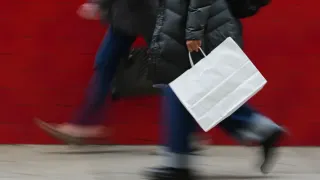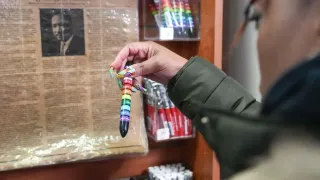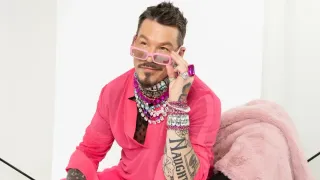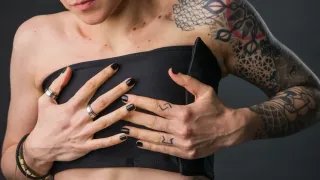November 1, 2023
Review: 'Rustin' with an Outstanding Colman Domingo a Terrific Look at Gay Architect of March on Washington
Mark Kennedy READ TIME: 3 MIN.
The 1963 March on Washington drew an estimated 250,000 people from across the country – the largest march at that point in American history – and was the place where the Rev. Martin Luther King Jr. delivered his iconic "I Have a Dream″ speech.
It likely wouldn't have happened without the work of a master strategist: Bayard Rustin, a gay Black socialist and pacifist-activist from Pennsylvania, whose close friendship with King was the engine in the early days of the Civil Rights Movement.
The winning, triumphant Netflix movie "Rustin" explores the stressful weeks leading up to the march from the grassroots level, with Colman Domingo starring as the organizer who many people know nothing about.
It was he who wrangled 80,000 boxed lunches, 22 first aid stations, six water tanks, 2,200 chartered buses, six chartered flights, 292 latrines, over 1,000 Black police officers and a change to the city's subway schedule, not to mention snagging celebrities like Marlon Brando, Charlton Heston, Lena Horne and James Baldwin.
Domingo is debonair, frisky, droll, passionate and utterly captivating as Rustin – the film representing the electric meeting of winning material with the perfect performer.
"You're irrelevant," Rustin is told at an after-work get-together by a more militant activist. "It's Friday night. I've been called worse," Rustin responds, taking a sip of his cocktail.
But as wonderful as Domingo is, it's the astonishing amount of talent in front of and behind the camera that will take your breath away. No matter how small, each performance brings fire and makes the most of a few minutes on camera.
Is that Jeffrey Wright as a dour Rep. Adam Clayton Powell? Yes, indeed. Wait, isn't that Adrienne Warren? Yup. Kevin Mambo and Audra McDonald, too? Yes and yes. Chris Rock ages up to play a stuffy NAACP Executive Secretary Roy Wilkins and Glynn Turman is awesome, as always, as labor leader A. Philip Randolph.
Da'Vine Joy Randolph plays Mahalia Jackson, Michael Potts is "Cleve" Robinson, CCH Pounder as Dr. Anna Hegeman, appropriately, gets her own warm round of applause during the movie. And Aml Ameen plays an understated King, his moments with Rustin playing like two old friends.
There's excellence in the music – Branford Marsalis provides the jazzy score, including lonely sax solos and mournful double bass plucks – and Lenny Kravitz contributed an original song, "Road to Freedom."
The biopic has a presidential seal or at least a former presidential seal – Barack Obama and Michelle Obama's Higher Ground produced. (Obama awarded Rustin a posthumous Presidential Medal of Freedom.)
"Rustin" is more than just the public-facing story of how the March on Washington came about. It's also a portrait of a man who has to hide his sexuality. If it was widely known, his career, the march and maybe even the Civil Rights Movement itself could be at risk.
Domingo shows the immense pressures faced by being a religiously-raised, Black gay man in the racist and homophobic 1960s, enough psychic forces to tear a man apart.
"On the day that I was born Black, I was also born a homosexual," Rustin tells King before a crucial meeting with Black leadership. "They either believe in freedom and justice for all or they do not."
Director George C. Wolfe, a theater legend, keeps this biopic intriguing, making it almost feel like a caper. Will they pull off their audacious effort? Of course, but the twists and turns endured make organizing the march a bit like the rush to get a big musical on its feet. Wolfe adds that energy.
The screenplay by Julian Breece and Dustin Lance Black isn't shy about exposing the divides within the movement and the ugly homophobic feelings of the era. There is a smart flashback to 1942 when the camera goes to black and white.
The movie take viewers to places perhaps unfamiliar, like to training sessions where Black police officers were taught about nonviolence and to Manhattan apartments where protesters would talk about their own stories of segregation to convince rich white folks to contribute money for buses.
The final section – the actual march itself – mixes new footage with some from that day. There was some fear by the organizers that not enough people would come, but the hero of "Rustin" doesn't waver – and is seen bluffing with reporters right up until the end. "Rustin" is as vibrant as the movement it covers.
"Rustin," opens in select theaters Friday and streams on Netflix starting Nov. 17.






